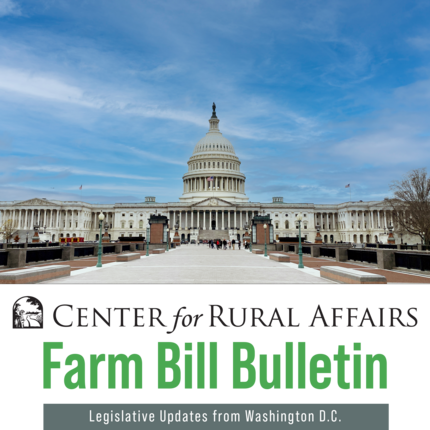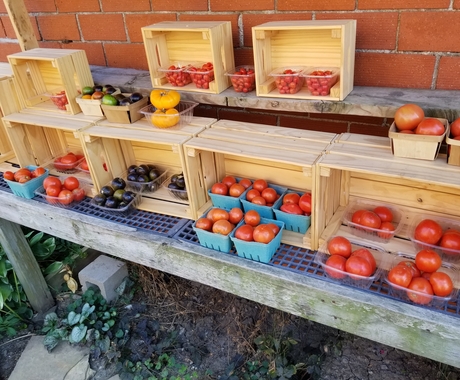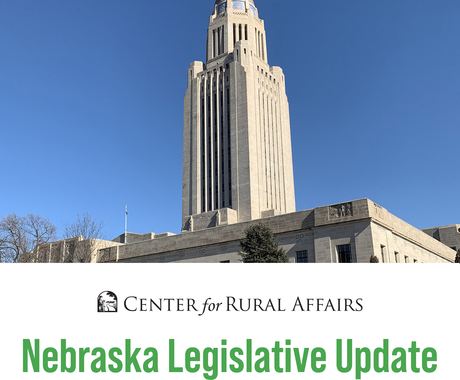By Kate Hansen, former staff member
This is the second installation of our “Farm Bill Bulletin” series, which provides intermittent updates on the development and status of our nation’s next farm bill. To read the first segment, which includes an overview of the farm bill process, click here.
While there is debate about when the next farm bill will be finalized, one thing is certain—farm bill discussions are in full swing in Washington, D.C. Earlier this month, lawmakers reached an agreement to suspend the debt ceiling, allowing them to refocus their efforts on writing the next farm bill.
One topic up for debate is meat processing. At the Center for Rural Affairs, we take particular interest in small meat processors—the local lockers and businesses that are staples on main streets across the country. Small meat processors provide important services to farmers, ranchers, consumers, and rural communities. Yet the challenges they face, including limited processing capacity and workforce, are significant.
In recent years, the Center has worked with lawmakers in Nebraska and Iowa to establish grant programs and other provisions to support small processors. In 2023, we were proud to take our efforts a step further and began offering loans to independent meat processors. Thanks to a Meat and Poultry Intermediary Lending Program (MPILP) grant from the U.S. Department of Agriculture (USDA), small processors have access to $15 million in loan capital through the Center for the next three years.
At the federal level, farm bill negotiations have the potential to positively impact small meat processors and keep programs like MPILP strong. A number of marker bills relating to small meat processing have been introduced this year. The list below includes those monitored by our staff.
S.354, H.R.945 Strengthening Local Processing Act: Introduced by Sen. John Thune (R-SD) and Rep. Chellie Pingree (D-ME), this legislation would amend the Poultry Products Inspection Act and the Federal Meat Inspection Act to help small and very small meat and poultry processing establishments increase capacity and build resiliency. If successful, the bill would create a competitive grant program to promote the expansion of small and very small establishments, state-inspected facilities, and custom-exempt facilities. It would also provide assistance to help processors meet federal health and safety standards, and support programs to train the next generation of local meat and poultry processors. Further, the legislation would increase federal cost share to encourage state inspection programs and participation in cooperative interstate shipment.
The legislation has been co-sponsored by three Democrats, two Republicans, and one Independent in the Senate, and six Democrats and one Republican in the House. The Center is proud to have played a part in the development of the bill, which was first introduced in 2020. It has received bipartisan support since, a testament to its common-sense provisions. We believe the bill reflects the priorities and needs of producers and rural business owners and will follow it closely in the months to come.
S.907, H.R.2814 Processing Revival and Intrastate Meat Exemption (PRIME) Act: Introduced by Sen. Angus King (I-ME) and Rep. Thomas Massie (R-KY), this legislation would amend the Federal Meat Inspection Act to allow meat processed at a “custom-exempt” facility to be sold commercially. Currently, meat processed at such a facility can only be consumed in the household of an owner or part-owner of the animal.
The legislation has been co-sponsored by six Republicans and one Democrat in the Senate and 27 Republicans and six Democrats in the House. This idea was viewed favorably by many during the peak of the pandemic. Since then, dozens of state and federal programs have helped increase the size and number of state or federally-inspected facilities available to livestock producers. Industry changes have likely undermined support for this proposal.
H.R.559 Butcher Block Act: Introduced by Rep. Dusty Johnson (R-SD), this bill would authorize USDA to make (or guarantee) loans and award grants for establishing, expanding, and otherwise supporting livestock and poultry processing and related activities. Through this process, USDA would prioritize applicants who have experience in livestock and poultry processing and can quickly scale up to increase overall processing capacity in the region.
The legislation has been co-sponsored by six Democrats and six Republicans in the House. As is the case with the PRIME Act, the processing industry has evolved since this legislation was first introduced. It is likely that many of the USDA programs established in the past two years have met the need this legislation was designed to address.
H.R.530 Amplifying Processing of Livestock in the United States (A-PLUS) Act: Introduced by Rep. Mark Alford (R-MO), this bill would direct the secretary of agriculture to amend certain regulations to clarify that livestock auction owners may have an interest in small meatpacking businesses.
The legislation has been co-sponsored by 13 Republicans and six Democrats in the House. It is intended to increase competition by allowing livestock markets to invest in local or regional processing facilities that process fewer than 2,000 animals per day for cattle and sheep and less than 10,000 per day for hogs. This has the potential to create significant change in the industry and would require careful implementation by USDA.
S.846, H.R. 1646 New Markets for State-Inspected Meat and Poultry Act: Introduced by Sen. Mike Rounds (R-SD) and Rep. Alexander Mooney (R-WV), this legislation would amend the Federal Meat Inspection Act and the Poultry Products Inspection Act to allow the interstate sale of state-inspected meat and poultry.
The legislation has been co-sponsored by eight Republicans, three Democrats, and one Independent in the Senate, and one Republican in the House. Currently, state-inspected meat cannot be sold across state lines unless those states are part of the Cooperative Interstate Shipment Program. Only 10 states participate in the program at this time. Because state meat inspection programs must meet the same health and safety standards as the USDA inspection programs, removing the prohibition on interstate shipment is a logical step.





